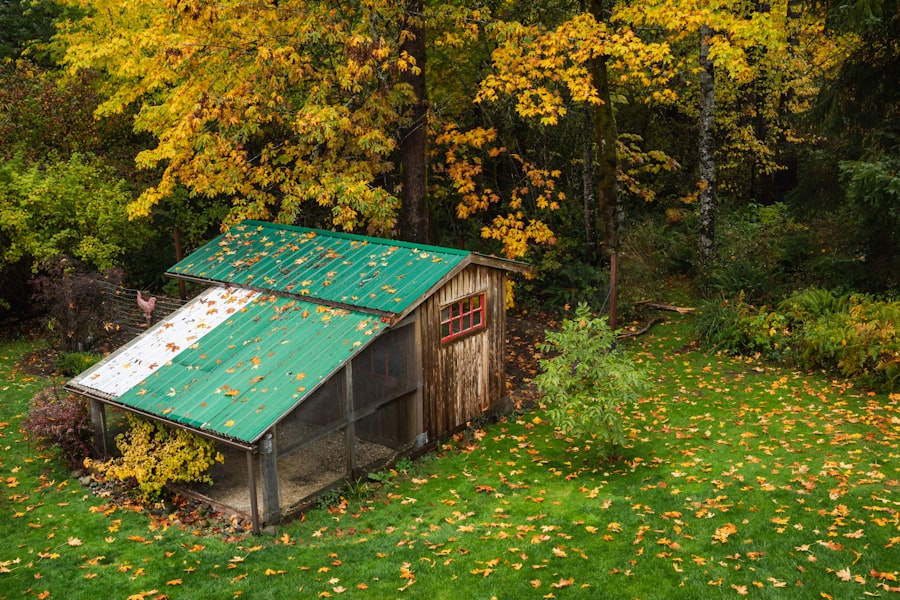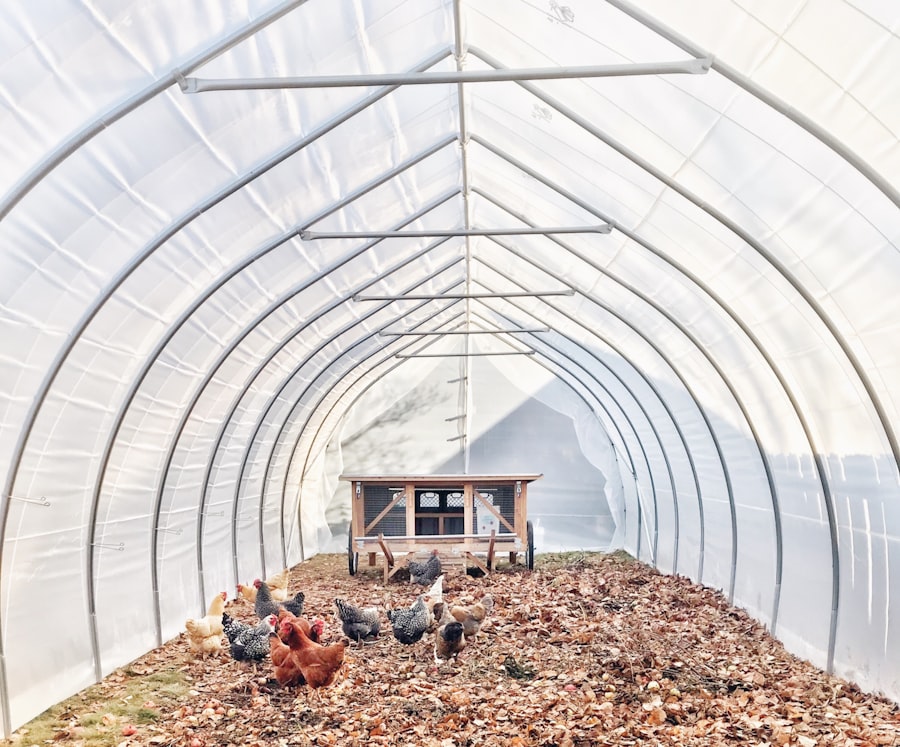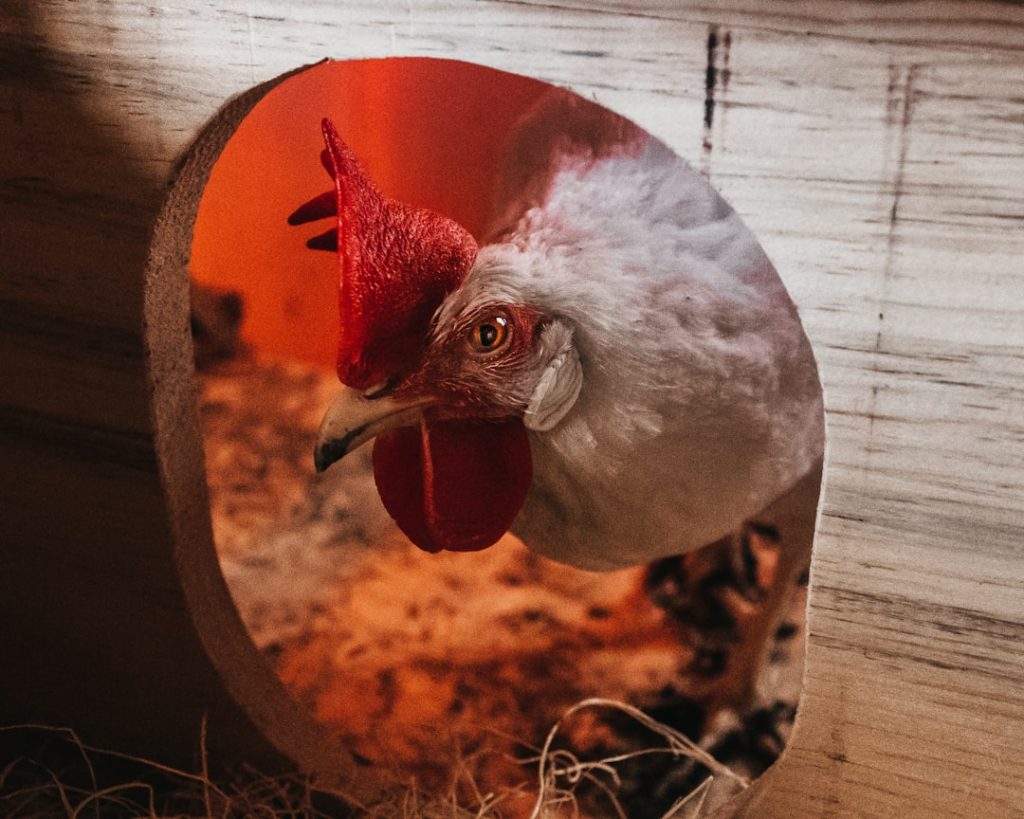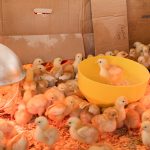When selecting a chicken run, several key factors should be considered. The size of the run is crucial, with a recommended minimum of 10 square feet per chicken, though more space is preferable. Security is paramount, requiring sturdy construction materials and predator-proofing measures such as buried wire mesh around the perimeter.
Flooring is an important aspect of run design. A solid base like concrete or gravel, covered with straw or wood shavings, is preferable to bare dirt. This helps maintain cleanliness, dryness, and reduces exposure to soil-borne pathogens.
The run’s location should be carefully chosen. A sunny area with good drainage is ideal, and accessibility for cleaning and maintenance should be taken into account. The overall design should prioritize the chickens’ safety, comfort, and well-being.
Adequate space allows for natural behaviors like scratching and dust bathing. A secure, predator-proof environment is essential for protecting the flock. Proper flooring and a well-chosen location contribute to the chickens’ health and the ease of run maintenance.
By considering these factors, chicken owners can create an outdoor space that meets their flock’s needs and ensures their safety and comfort.
Table of Contents
Key Takeaways
- Choose a run that provides enough space for your chickens to roam and forage
- Ensure the run has adequate shelter to protect your chickens from the elements
- Proper ventilation and sunlight are essential for the health and well-being of your flock
- Implement a secure fencing system to keep predators out and your chickens safe
- Provide enrichment and entertainment to keep your chickens happy and stimulated
- Regularly maintain cleanliness and hygiene in the coop and run area
- Monitor and manage the health of your flock to prevent and address any potential issues
Providing Adequate Space and Shelter
Space Requirements
As a general rule, you should allow at least 2-3 square feet of indoor space per chicken, and at least 8-10 square feet of outdoor space in the run. However, more space is always better if possible, as overcrowding can lead to stress, aggression, and an increased risk of disease.
Shelter Essentials
In addition to space, it’s important to provide suitable shelter for your chickens. This includes a secure coop for sleeping and laying eggs, as well as a covered run for protection from the elements. The coop should be well-ventilated and insulated, with roosts for the chickens to perch on at night. It should also have nesting boxes filled with clean bedding for the hens to lay their eggs.
Meeting Physical and Psychological Needs
When providing space and shelter for your chickens, it’s important to consider their physical and psychological needs. Ample space allows the chickens to move around freely and engage in natural behaviors, while suitable shelter provides protection from the elements and a safe place to rest and lay eggs. By ensuring that your chickens have enough space and suitable shelter, you can help to promote their health and well-being.
Ensuring Proper Ventilation and Sunlight

Proper ventilation and sunlight are crucial for the health and well-being of your chickens. Good ventilation helps to remove excess moisture, ammonia, and other harmful gases from the coop, which can lead to respiratory problems and other health issues if allowed to build up. It also helps to regulate temperature and humidity levels, which is important for preventing heat stress in the summer and frostbite in the winter.
To ensure proper ventilation, you should provide plenty of windows, vents, and openings in the coop, as well as a covered run with open sides for fresh air circulation. In addition to ventilation, it’s important to provide plenty of natural sunlight for your chickens. Sunlight is essential for vitamin D production, which is important for bone health and egg production.
It also helps to regulate the chickens’ circadian rhythms, which can have a positive impact on their behavior and overall well-being. To ensure that your chickens get enough sunlight, you should position their coop and run in a sunny spot with good exposure to natural light. You can also provide additional light sources such as artificial bulbs or solar-powered lights if necessary.
Proper ventilation and sunlight are essential for maintaining a healthy environment for your chickens. Good ventilation helps to remove harmful gases and regulate temperature and humidity levels, while sunlight is important for vitamin D production and overall well-being. By ensuring that your chickens have access to fresh air and natural light, you can help to promote their health and happiness.
Implementing a Secure Fencing System
Implementing a secure fencing system is essential for keeping your chickens safe from predators and other potential threats. When it comes to choosing a fencing system for your chicken run, there are several options to consider. One popular choice is welded wire mesh, which is strong and durable enough to keep out most predators such as foxes, raccoons, and dogs.
Another option is electric fencing, which delivers a mild shock to deter predators from attempting to breach the perimeter. This can be particularly effective for deterring larger predators such as coyotes or bears. In addition to choosing the right type of fencing, it’s important to ensure that the fencing system is properly installed and maintained.
This means burying wire mesh around the perimeter of the run to prevent digging predators from gaining access, as well as regularly checking for any signs of damage or wear and tear. It’s also important to consider the height of the fencing, as some predators such as raccoons are adept climbers and may be able to scale lower fences if given the opportunity. When implementing a secure fencing system for your chickens, it’s important to consider the type of predators in your area and choose a fencing system that will effectively deter them.
This may include options such as welded wire mesh or electric fencing, as well as ensuring that the fencing is properly installed and maintained. By taking these steps, you can help to keep your chickens safe from harm.
Providing Enrichment and Entertainment
Providing enrichment and entertainment for your chickens is important for keeping them happy, healthy, and stimulated. Chickens are intelligent animals with natural instincts for scratching, pecking, dust bathing, perching, and exploring their environment. By providing opportunities for these natural behaviors, you can help to prevent boredom and reduce stress-related behaviors such as feather pecking or aggression.
There are many ways to provide enrichment and entertainment for your chickens. This can include providing perches at different heights for them to roost on, as well as hiding spots such as logs or bushes where they can seek shelter or explore. You can also provide hanging toys or treats such as cabbage or corn on the cob for them to peck at or play with.
Additionally, allowing them access to a variety of natural materials such as straw or wood shavings can provide opportunities for nesting and dust bathing. In addition to physical enrichment, it’s also important to provide mental stimulation for your chickens. This can include providing opportunities for them to explore new areas or objects in their environment, as well as offering novel food items or treats to keep them engaged.
By providing enrichment and entertainment for your chickens, you can help to promote their physical and psychological well-being.
Maintaining Cleanliness and Hygiene

Regular Cleaning and Waste Removal
Regularly cleaning out the coop and run is essential to remove droppings, soiled bedding, and other waste materials that can harbor harmful bacteria or parasites. It’s also important to regularly replace bedding materials such as straw or wood shavings to keep the area clean and dry.
Good Hygiene Practices
In addition to regular cleaning, practicing good hygiene when handling your chickens or their eggs is vital. This includes washing your hands thoroughly before and after handling the birds or their eggs, as well as wearing protective clothing such as gloves or aprons if necessary.
Monitoring Your Flock’s Health
Regularly inspect your flock for any signs of illness or injury, and seek veterinary care if necessary. By maintaining cleanliness and hygiene in your chicken coop and run, you can help to prevent disease and promote the health of your flock.
Monitoring and Managing the Health of Your Flock
Monitoring and managing the health of your flock is essential for preventing disease outbreaks and ensuring the well-being of your chickens. This includes regularly inspecting your birds for any signs of illness or injury, such as changes in behavior, appetite, or egg production. It’s also important to monitor their overall condition, including their weight, feather quality, and general appearance.
In addition to regular monitoring, it’s important to have a plan in place for managing any health issues that may arise. This may include having a relationship with a veterinarian who specializes in poultry health, as well as having a basic understanding of common poultry diseases and their symptoms. It’s also important to have a quarantine area set up in case you need to isolate any sick or injured birds from the rest of the flock.
By monitoring and managing the health of your flock, you can help to prevent disease outbreaks and ensure the well-being of your chickens. This includes regularly inspecting your birds for any signs of illness or injury, having a plan in place for managing health issues that may arise, and seeking veterinary care if necessary. In conclusion, providing a suitable outdoor run with adequate space, shelter, ventilation, sunlight exposure, secure fencing system, enrichment activities, cleanliness maintenance practices are all essential components of responsible chicken husbandry practices that contribute significantly towards ensuring optimal health conditions for poultry farming operations.
If you’re looking for tips on how to keep chickens in a run, you might also be interested in learning about what vegetables quails eat. Check out this article to discover the best vegetables to feed your quails for optimal health and nutrition.
FAQs
What is a chicken run?
A chicken run is an enclosed outdoor area where chickens can roam, exercise, and forage while being protected from predators.
Why is a chicken run important?
A chicken run is important for providing chickens with space to move around, access to fresh air and sunlight, and protection from predators.
How big should a chicken run be?
The recommended minimum space for a chicken run is 10 square feet per chicken. However, more space is always better for the chickens’ well-being.
What should be included in a chicken run?
A chicken run should include perches, dust baths, shade, and access to fresh water and food. It should also be securely fenced to prevent predators from entering.
How can I predator-proof my chicken run?
To predator-proof a chicken run, use hardware cloth or welded wire fencing with small openings, bury the fencing underground to prevent digging predators, and install a secure door or gate.
How do I maintain a chicken run?
Regular maintenance of a chicken run includes cleaning out droppings, providing fresh bedding, and checking for any signs of wear or damage to the fencing or structures. Regularly moving the run to fresh ground can also help prevent the build-up of parasites and disease.
Meet Walter, the feathered-friend fanatic of Florida! Nestled in the sunshine state, Walter struts through life with his feathered companions, clucking his way to happiness. With a coop that’s fancier than a five-star hotel, he’s the Don Juan of the chicken world. When he’s not teaching his hens to do the cha-cha, you’ll find him in a heated debate with his prized rooster, Sir Clucks-a-Lot. Walter’s poultry passion is no yolk; he’s the sunny-side-up guy you never knew you needed in your flock of friends!







